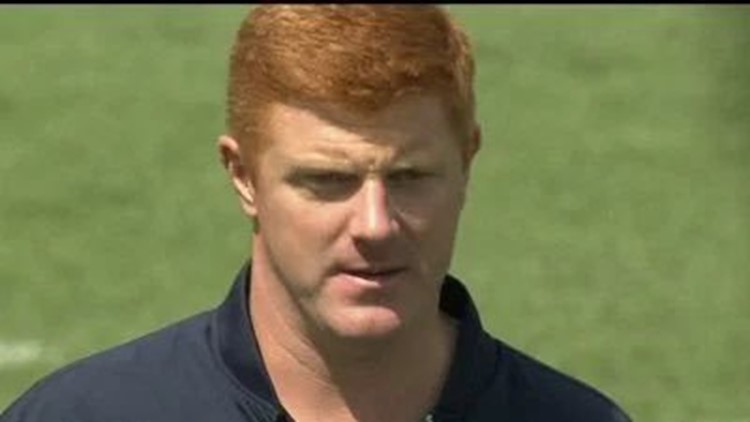BELLEFONTE, Pa. — Closing arguments have concluded in the civil lawsuit case of former Penn State football player and assistant coach Mike McQueary against the university, and the jury will begin deliberations this afternoon.
The nine-woman, three-man panel, which includes two Penn State employees, will be charged with deciding McQueary’s claims that Penn State is guilty of defamation and misrepresentation in regards to his coming forward with information he saw Jerry Sandusky sexually abuse a young boy in a Penn State locker room shower.
Senior Judge Thomas Gavin, of Chester County, will decide McQueary’s whistleblower claim that he was wrongfully terminated by Penn State in 2012 after his name became public as the graduate assistant named in the 2011 grand jury presentment.
McQueary’s grand jury testimony also led to the indictments of former Penn State administrators Tim Curley and Gary Schultz.
“What Penn State has done to Mike McQueary is absolutely outrageous,” McQueary’s attorney Elliot Strokoff told the jury. “Not investigating but then telling him it was investigated? It’s outrageous and should never ever be able to happen again.”
Strokoff seemed to indicate he wanted the jury to send a message to other universities to deter them from incidents like this in the future.
Penn State claims in its defense that McQueary’s reputation was harmed not by their decisions to release a statement in support of Curley and Schultz, nor the school’s decision to put him on administrative leave just days after his name became public. Instead, Penn State attorney Nancy Conrad told the jury it was national media and public opinion which resulted from McQueary’s own decisions which led to his downfall.
One of Penn State’s main defense points is that McQueary had more of an obligation to stop Jerry Sandusky when he witnessed him with a young boy in a Lasch Football Complex shower, instead of just telling his head coach, Joe Paterno.
“Any injury to his reputation is not the result of Penn State,” Conrad said, “but the result of his own failures. His own failures to act…on the night of Feb 11, 2001.”
Penn State maintains any claims that the school, under the leadership in 2001 by Curley and Schultz, misrepresented McQueary cannot be proven because the two administrators declined to testify under their Fifth Amendment rights to not self-incriminate. Curley and Schultz, as well as former university President Graham Spanier, are currently facing child endangerment and failure to report charges in Dauphin County. Their perjury charges were recently dropped.
McQueary claims he was unable to find work as a college football coach in the months and years after the school placed him on administrative leave. He was not given a courtesy interview when Bill O’Brien was named Penn State head coach in January 2012 while other coaches were.
However, Penn State witnesses Matt Rhule, the current head coach at Temple University and McQueary’s former high school and college teammate, as well as O’Brien, say McQueary was never qualified enough to join their coaching staffs.
“He has not developed the contacts or has the national reputation to land a position in the field of football,” Conrad told the jury. “He’s not done the research to land a job outside of football, but Mr. McQueary wants you to put Penn State responsible for his own failures.”
Penn State says the school placed McQueary on administrative leave for his own safety. Multiple threats, including death threats, were sent to he and the university in the days after his name was mentioned in media reports from the grand jury presentment on Nov. 6, 2011.
Elliot Strokoff, McQueary’s lead attorney, says there is no evidence of multiple death threats.
During the trial, an investigator with the Pennsylvania Office of the Attorney General said they never took the threats seriously because none were reported to them from local police.
Penn State claims that despite placing McQueary on administrative leave, the university continued to pay him his full $140,000 salary plus benefits until his contract was terminated on June 30, 2012. Penn State then paid McQueary his full severance through December 2013. All told, the university estimates paying McQueary approximately $280,000, plus benefits, over that 25 month period that he did not work.
Strokoff says McQueary’s claim of defamation goes back to a statement Spanier wrote on Nov. 5, 2011 in which he announced his “unconditional support” for his top administrators Curley and Schultz, calling their criminal charges “groundless.”
However, Strokoff stressed that Spanier admitted during testimony that he did not read the grand jury presentment until after Penn State released his statement.
“How can the charges be groundless unless the grad student (McQueary) lied to the grand jury?” Strokoff asked. “It’s a reckless indifference to the truth.”
McQueary is seeking $4 million in damages from the university.
Jury deliberations are expected to begin Thursday afternoon.



